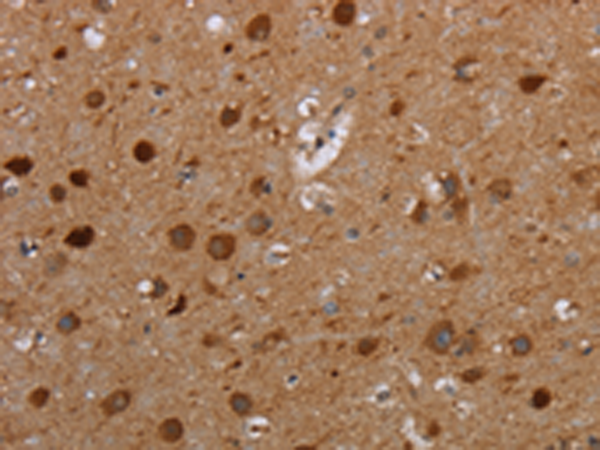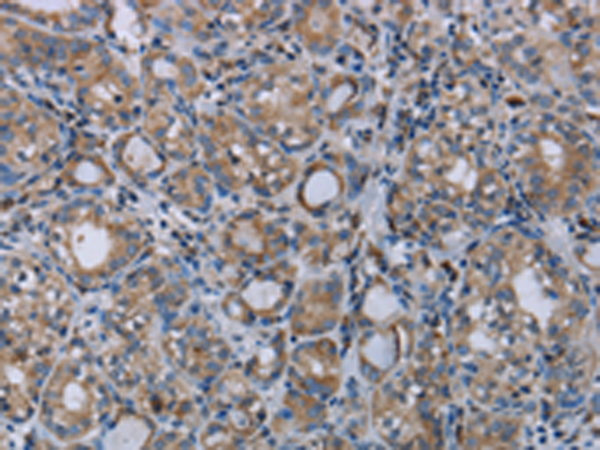

| WB | 咨询技术 | Human,Mouse,Rat |
| IF | 咨询技术 | Human,Mouse,Rat |
| IHC | 1/25-1/100 | Human,Mouse,Rat |
| ICC | 技术咨询 | Human,Mouse,Rat |
| FCM | 咨询技术 | Human,Mouse,Rat |
| Elisa | 1/1000-1/2000 | Human,Mouse,Rat |
| Aliases | MDM2BP |
| Host/Isotype | Rabbit IgG |
| Antibody Type | Primary antibody |
| Storage | Store at 4°C short term. Aliquot and store at -20°C long term. Avoid freeze/thaw cycles. |
| Species Reactivity | Human, Mouse |
| Immunogen | Synthetic peptide of human MTBP |
| Formulation | Purified antibody in PBS with 0.05% sodium azide and 50% glycerol. |
+ +
以下是关于MTBP抗体的3篇参考文献示例(注:部分信息可能需通过学术数据库核实准确性):
---
1. **文献名称**: *MTBP regulates DNA replication timing in cancer cells via interaction with the MCM complex*
**作者**: Yoshida, K. et al.
**摘要**: 研究通过MTBP特异性抗体发现其与MCM复合物相互作用,调控癌细胞DNA复制时序,揭示MTBP在基因组稳定性中的新功能。
---
2. **文献名称**: *High MTBP expression correlates with poor prognosis in triple-negative breast cancer*
**作者**: Smith, L.M. & Jones, R.T.
**摘要**: 利用MTBP抗体进行免疫组化分析,发现MTBP在三阴性乳腺癌中高表达,且与患者生存率降低相关,提示其作为预后标志物的潜力。
---
3. **文献名称**: *MTBP antibody-based screening identifies its role in suppressing c-Myc-driven tumorigenesis*
**作者**: Gupta, S. et al.
**摘要**: 研究采用MTBP抗体进行功能阻断实验,证实MTBP通过抑制c-Myc转录活性调控肿瘤发生,为靶向治疗提供理论依据。
---
建议通过PubMed或Google Scholar以“MTBP antibody”、“MTBP cancer”等关键词检索最新文献获取准确信息。
MTBP (Mdm2-binding protein) is a multifunctional protein first identified through its interaction with Mdm2. a key negative regulator of the tumor suppressor p53. Discovered in the early 2000s, MTBP plays roles in cell cycle regulation, DNA replication stress response, and oncogenesis. Structurally, it contains an Mdm2-binding domain and a conserved N-terminal domain involved in protein interactions. MTBP facilitates Mdm2-mediated degradation of p53. linking it to p53-dependent tumor suppression. However, studies also highlight p53-independent functions, including modulation of the Akt/mTOR and Hippo signaling pathways, influencing cell proliferation, migration, and metastasis.
MTBP’s dual role in cancer remains context-dependent: it exhibits oncogenic properties in certain cancers (e.g., breast, lung) by promoting cell survival and invasion, while acting as a tumor suppressor in others (e.g., melanoma). This complexity drives interest in MTBP antibodies as research tools to study its expression, localization, and interactions in cancer models. Commercial MTBP antibodies are widely used in techniques like Western blot, immunohistochemistry, and immunofluorescence to explore its diagnostic or therapeutic potential.
Current research focuses on clarifying MTBP’s mechanistic roles in replication stress, metastasis, and therapy resistance, with antibodies critical for validating its clinical relevance as a biomarker or target. Challenges include resolving isoform-specific functions and optimizing antibody specificity across diverse experimental systems.
×